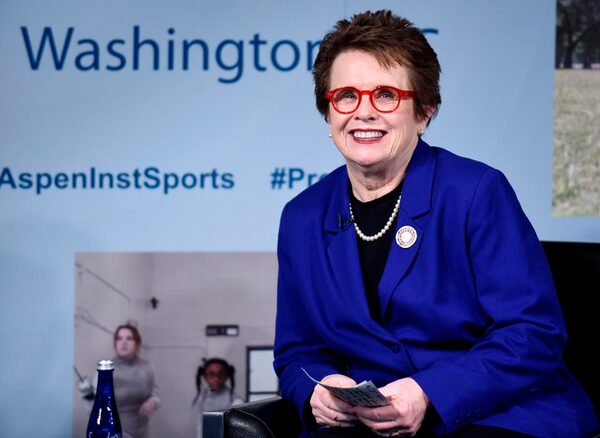
In this May 17, 2016, file photo, tennis legend Billie Jean King participates in a discussion at the Aspen Institute's 2016 Project Play Summit at the Newseum in Washington.Susan Walsh/The Associated Press
The Fed Cup is being renamed after one of the most famous female tennis stars in history.
The International Tennis Federation said Thursday that its women’s global team tournament is now called the Billie Jean King Cup by BNP Paribas, named for the former World No.1 and lifelong campaigner for equality.
King was 19 when she played in the first Fed Cup, in 1963 as a member of the victorious U.S. team. In 1973, she founded the Women’s Tennis Association, was its first president and famously defeated Bobby Riggs in the Battle of the Sexes. Now comes another trail-blazing moment: This is the first major global team sporting competition named after a woman.
“I’m thrilled, and I still can’t believe it,” King told The Globe and Mail in a wide-ranging telephone interview this week. “Is this real, or am I dreaming? Sometimes I wake up in the night and think, wow, pinch me. I think it’s good for women, and good for people.”
The rebranding follows last year’s changes to the competition format and an increase in prize money. The ITF, the governing body of world tennis, created the Fed Cup Finals, with the top 12 teams set to compete over one week for player prize money totalling US$12-million. That brings the prize money in line with the equivalent men’s tournament, the Davis Cup. The 2020 champs were to be crowned at the Finals in Budapest in April, but it was postponed one year because of the COVID-19 pandemic.
King has had a front seat to the tournament’s evolution, from 1963 when it attracted 16 teams and awarded no prize money, to the modern version, with more than 100 teams competing annually. She hoisted the Fed Cup more times than anyone – seven times as a player and four times as a captain (including once as a player-captain).
“The prize money is both a message and a measuring stick,” King said. “So it really sends a very positive message to the world that we’re improving, we’re getting better, we’re getting closer.”
Now 73, King talks excitedly as she shares vivid memories of her Fed Cup appearances. She speaks animatedly about wanting to make history with American teammates Darlene Hard and Carole Caldwell as the first champions. She talks about the tight final matches over Australia, the rain that pushed them indoors, and their captain, Bill Kellogg, being so excited by the victory that he fell off his bench.
She remembers the star power of Chris Evert and Martina Navratilova at the tournament over the years, and the incredible teenager Steffi Graf bursting onto the scene. King captained U.S. teams packed with talent, from Monica Seles, to Jennifer Capriati and Lindsay Davenport.
“To play for your country, I always thought there was nothing quite like it,” King said. “A lot of tennis players never played for a school team or went to college. I find team players are more thoughtful if they grow up in a team atmosphere. For some, this tournament is the first-ever chance to represent their country and that can be so exciting.”
The ITF’s news release says the name change will provide the opportunity for increased global exposure and investment in women’s tennis. The rebranding recognizes King’s achievements and ensures she continues as a visible role model for generations.
“The Davis Cup is named after a man, so it is absolutely right that the women’s World Cup of tennis is named after a woman,” said Katrina Adams, ITF vice-president and Fed Cup committee chair. “Given all she has achieved in our sport and her tireless efforts to champion equality around the world, I can’t think of a more worthy recipient of this honour than Billie Jean King.”
In 2019, King took up a new role as the Fed Cup’s first global ambassador, where she continued her work promoting gender equality in tennis. She is ever-present in tennis circles, mentors many, and has her finger on the pulse of their causes and passions.
King spoke admiringly of rising teen star Coco Gauff, who spoke from the heart at a Black Lives Matter rally, and Naomi Osaka, who wore masks to recognize seven different black Americans – one for each of the seven rounds of the U.S. Open, which she won. She loves to see female athletes using their platforms to fight for equality.
“I thought it was great, because Black lives do matter,” King said of Gauff and Osaka. “They’re very articulate, very caring and true leaders. It shows you can be a leader at any age.”
King was touched by a recent open letter penned by Canada’s U.S. Open champion, Bianca Andreescu, who wrote a public thank you to King and the eight other female players – known as the Original 9. Exactly 50 years ago, they risked their careers to fight for equality, signing $1 contracts to launch the Virginia Slims Tour, a women’s professional tennis circuit.
“Bianca wrote a beautiful letter to the Original 9. She’s fantastic. She and I stay in touch a lot,” King said. “I think she’s a great leader and I can’t wait to see her back on the court because I miss her. She’s so very gifted, so versatile, very smart. She has a great sense of courage. She has that ‘it’ factor.”
King keeps remarkably busy advocating for gender equality and social justice. As the interview wraps up, she makes sure to point out the societal difference in the way male and female leaders are often perceived.
“When a women does something, she does it for everyone, not just for women,” King said. “For some reason, when a man does something, it’s for everyone but when a woman does it, it’s seen as only for women. We are leaders, and we do it for everyone. It’s for tennis.”
 Rachel Brady
Rachel Brady